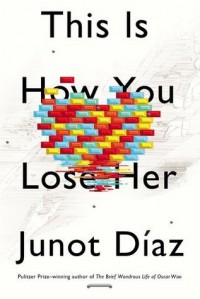"So it goes."
Ella Mc's book blog. Brand new 2018 - Only books read after 1st January 2018
Rereading Junot Díaz in light of recent events - the cycle of abuse harms us all

Men may feel they get the upper hand by treating women poorly, but long before "me too" Yunior told us otherwise in these stories and in the novel.
Reread these after recent revelations by both Junot Díaz & women who were victimized by him. I was interested to see how this would affect the reading.
If you've missed the fireworks, a quick rundown:
- Junot Díaz publishes a personal essay in the New Yorker (The Silence: The Legacy of Childhood Trauma) revealing that he was the victim of repeated childhood sexual abuse by a man in his neighborhood, that he's paid dearly for it, can no longer write and has mistreated women tremendously while trying to hide behind a mask of machismo.
- Fairly quickly he is confronted by a number of women, notably women of color, other writers of sexual misconduct and verbal abuse.
- He decides (with the full blessing of the committee) not to take his place as Chair of the Pulitzer committee.
- Bookstores decide to remove his books from the shelves, others keep him on, nobody knows what the right thing to do is, and everyone picks a side.
All of this led to discussions - hell, thousands of discussions - around me, with women, with other survivors, with everyone but writers. I don't know any writers or I'm sure they'd have talked to me too. EVERYONE in the trauma community was afire with this discussion. Eventually some of us got around to his writing, and my response was that I hoped I'd still be able to read it, since I really have been a fan, and it made me sad to read in the NYer that he could no longer write. Then I grabbed these short stories off my shelf and read them. This is where I landed:
I loved these the first time I read them. I was just as uncomfortable with the over-flexing of what we now call toxic masculinity then as I was this time. In fact, I think my reaction was pretty much the same: the narrator's toxicity harms him and everyone else in his life, including his great love - but in the end, he's hurt himself badly (some great female writer might want to take the feminine perspective someday.) If only we could get people in real life to own up to how harmful toxic masculinity actually is for everyone.
The character in these stories is clear on how he's harmed himself, and while he may use bravado to try and mask his torment, it clearly doesn't work. Everything, including his body, breaks down.
Explanations are not Excuses.
This is not to say that these fictional stories should be taken as an indicator of real life, but misogyny is a problem for everyone, and the pain in the voice of these stories spells that out. In fact, I think these stories might be used as an example of how badly misogynistic bullshit works out for everyone. Men may feel they get the upper hand by treating women poorly, but long before "me too" Yunior told us otherwise in these stories and in the novel.
As a person who has lived through some stuff, I'm glad to have read these stories the first time and again now. They are excellent, and the message is probably more clear now than it was the first time I read it, though my history hasn't changed at all. I still react badly to the mind games, abuses of power and name calling, AND I appreciate the stories. They have a moral dimension I now see even more clearly, and it's about far more than diversity or a "unique voice." Yunor spells out how harmful his misogynistic buddies and lifestyle are to both the women and the men in his life.
Sexual abuse begets pain, anger, confusion, acting out and abuse - sometimes even more sexual abuse. The issue is not on whose side will we fight - we should all be on the side of protecting children and getting everyone (including rapists and child molestors) help before this cycle begins in yet another person. Otherwise we are doomed to an assembly line of horrors. I'd bet that if you spoke to the man who abused Junot Díaz, he'd probably have some horror tales to share about his life. None of this excuses anyone. It does show how harmful it all is for everyone, be it the abused person, the perpetrator or the many people who have relationships with either of them through lifetimes. Abuse is poison. It harms souls. It murders a part of us that we can never regain.
When we have no tools for coping with this existential terroristic threat, we often cope in tremendously harmful ways - both to ourselves and those we love. Interpersonal relationships are forever changed, and we're all the victim - everyone in society.
This is why "rape culture" and "toxic masculinity" must end. It's killing as many men as it is women. It's a way of acting out, and it's unacceptable, if understandable. It will reach us all eventually, and nobody comes through unscathed.
As for the stories, the final line "sometimes a start is all we ever get" rings just as poignantly as it did before I knew so much about Junot Díaz.




 6
6
 1
1
